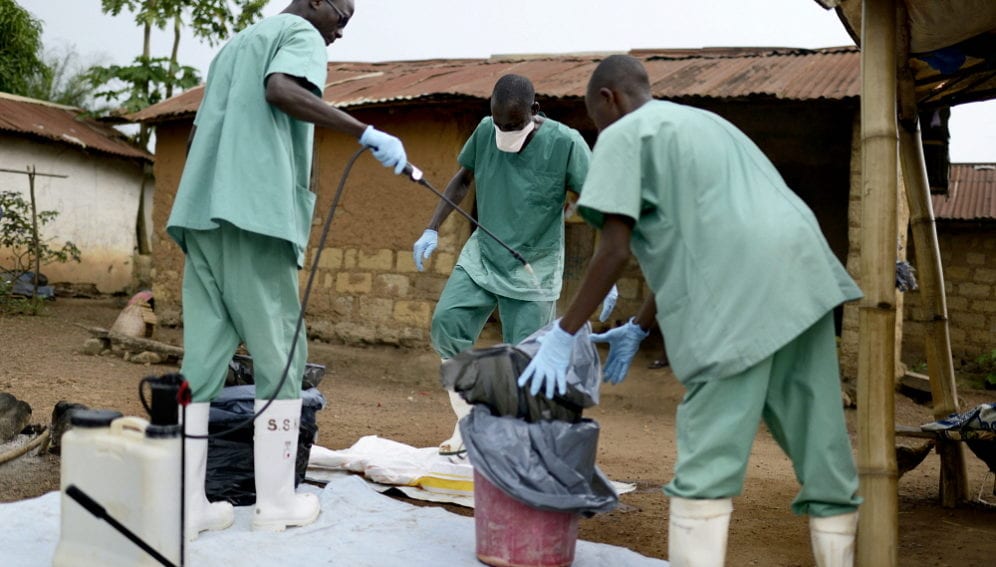By: Aamna Mohdin
Send to a friend
The details you provide on this page will not be used to send unsolicited email, and will not be sold to a 3rd party. See privacy policy.
The world’s worst-ever Ebola outbreak has killed more than 670 people in West Africa since February, with fears that it is spreading between different areas more easily than previous outbreaks.
The viral disease kills up to 90 per cent of those it infects, usually within ten days of illness.
Tom Solomon, director of the Institute of Infection and Global Health at the University of Liverpool, United Kingdom, described Ebola in a Science Media Centre (SMC) statement as “one of the most severe infections of humans”.
He added that Ebola is worrying because it is not completely clear how humans become infected at the start of an outbreak and since it can spread from human to human.
This outbreak is different from others, Solomon said, because of its size and because “it appears to be spreading between different geographical places more easily than other outbreaks”.
“There is no antivirus drug to treat Ebola,” he added. “There is no vaccine to protect people.”
The current epidemic has spread from Guinea to Liberia and Sierra Leone, and now Nigeria. There have been more than 1,200 cases so far.
The virus is transmitted through contact with the blood and other bodily fluids of infected people or animals, such as fruit bats. Symptoms include fever and bleeding from the mouth and other orifices. Infected people typically start to show symptoms after four to ten days.
“The fact that this Ebola outbreak has spread more than any previous ones is worrying,” Solomon said, but because it does not spread via the respiratory route “it is unlikely to cause a pandemic like flu”.
He said that people who survive the disease could remain infectious for two months.
Tomorrow the WHO is expected to launch a US$100 million Ebola outbreak response plan. This, it says, will involve sending at least 120 fresh WHO medical staff to Africa to help contain the outbreak.
It says that key elements of the plan would involve stopping transmission of Ebola to neighbouring countries “through scaling up effective, evidence-based outbreak control measures”.
In the SMC statement, Andrew Easton, a virologist at the University of Warwick, United Kingdom, said: “Ebola virus can persist for several weeks in patients who have recovered and are not presenting with any symptoms of disease.”
This, he said, “provided a mechanism for the virus to reappear after an outbreak was apparently declining”.
Research suggests that the virus — which exists naturally in some fruit bats — is being spread directly from bats to humans.
The UN’s Food and Agriculture Organization (FAO) warned West African communities last week of the risk of contracting the Ebola virus from hunting for bushmeat. The FAO called for a greater awareness of the danger of eating certain species such as fruit bats.
“We are not suggesting that people stop hunting altogether, which isn’t realistic,” FAO chief veterinary officer Juan Lubroth said in a press release.
“But communities need clear advice on the need not to touch dead animals or to sell or eat the meat of any animal that they find already dead. They should also avoid hunting animals that are sick or behaving strangely, as this is another red flag.”
“While we know a great deal about the virus, we have a long way to go in providing effective and accessible prevention and treatment for those at risk.”
Andrew Easton, University of Warwick
Solomon added: “Family members and healthcare workers looking after patients are especially at risk. In the early outbreaks, the lack of precautionary and protective measures and the reuse of non-sterilised needles contributed to the rapid spread.
“Some traditional burial customs, whereby all mourners touch the body, also causes the virus to spread, because the virus may be on the skin.”
Earlier this week (29 July), Sierra Leone’s chief medical officer announced that Sheik Umar Khan, the doctor leading the country’s fight against the Ebola outbreak, had died from the virus. Several other health workers have also been infected.
According to Easton, modern diagnostic tools, such as blood tests, that could rapidly identify Ebola virus are not readily available in isolated rural areas of Africa.
“This is unfortunate because rapid diagnosis early in an outbreak is likely to reduce the impact of the infection,” he said.
“The overall picture is that, while we know a great deal about the virus, we have a long way to go in providing effective and accessible prevention and treatment for those at risk.”
> Link to SMC statement
> Link to FAO statement














